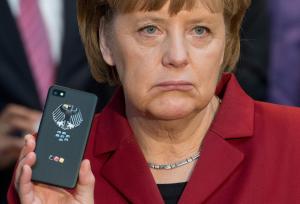nsnbc : German Chancellor Angela Merkel, Sunday while addressing a rally at an election campaign event in Germany’s Free Federal State Bavaria, said Europeans should determine their own destiny. Merkel and other German politicians will have to adjust their election campaigns to a post-WW II electorate where the majority of voters have not been subject to post-war “reeducation”.
 Commenting on the election of U.S. President Donald Trump, the UK leaving the European Union (Brexit) and related issues, Merkel said “Europeans really have to take destiny into their own hands. … The times when we could fully rely on others are to some extent over.”
Commenting on the election of U.S. President Donald Trump, the UK leaving the European Union (Brexit) and related issues, Merkel said “Europeans really have to take destiny into their own hands. … The times when we could fully rely on others are to some extent over.”
The German Chancellor added that Germany and Europe would strive to have good ties with the United States, Britain as well as other countries, “even with Russia”. But she emphasized that “We have to know that we must fight for our future on our own.”
Merkel didn’t further elaborate the reasoning behind her remarks but many German media speculated Merkel was referring her frustrating experience at the G7 meeting earlier this week in Italy’s Sicily.
Merkel described the summit as “very difficult, not to say very unsatisfactory”. Some of the agendas were especially tough for Merkel, among them was the rise of protectionism and the discussion about the Paris agreement on climate change.
Six of the seven nations agreed to stick with their commitment to implement 2015 deal to tackle global warming. However, Trump in the end refused to endorse it, saying he needed more time to decide.
However, Merkel may also have been trying to appeal to many of the German voters who would like to see a Germany with equally good ties and equal distance to Washington and Moscow, and who don’t see Germany as permanently and solidly anchored in NATO. The surprising outcome of a poll conducted in 2014 may help explain Merkel’s posturing.
In 2014 discussions about foreign, that is both Western and Russian interference in Ukraine, reopened old wounds in Germany, which then 64 years after the end of the war in 1945 and the occupation by allied forces, still was and still is under de-facto administration of the Supreme Headquarters Allied Command. Major decisions in Germany cannot be made without the approval from Washington and London, regardless how much Washington, London and Berlin attempt to sugarcoat the fact behind statements of freedom and democracy.
The German, state-owned TV Channel ARD reported that 49 percent of Germans, polled in a recent DeutschlandTrend poll, would like to see Germany as a bridge between the East and the West, maintaining a policy of equal distance to both the western alliance and Russia. Only 45 percent view Germany as a country that is a solidly anchored part of the West. Not surprisingly, there is a significant variance in opinions, depending on whether one asks people in the western or in the eastern Federal States.
Only 31 percent in the eastern Federal States, the former German Democratic Republic, perceive Germany as “solidly anchored in the western alliance” while 60 percent would like to see Germany assuming a “position in-between”, reports ARD, citing the DeutschlandTrend poll.
Even though the poll in March 2014 revealed that Germans’ are suspicious about Putin and Russia, the NATO decision to increase its military presence in the eastern NATO member states was rejected by the majority of Germans. Only 40 percent approved of NATO’s increased presence in NATO’s eastern air-space, while 53 percent disapproved. It is worth noting that these opinions were then strongly biased by a borderline hysteric anti-Russian propaganda in German and western media since December 2013.
Both the United States and the UK are doing their part to maintain the status quo, to the extend that analysts warn, that any development of close political, economic and energy-related ties between Europe and Russia, and particularly between Germany and Russia, that would challenge the dominance of the US – UK axis over European geopolitics, will be opposed by the USA and the UK.
But then again, most just somewhat politically sophisticated voters are not naive about Moscow’s role prior to World War II either. The bullying of the Baltic states and Finland, the threat to march into Romania to cut Germany off of oil supplies and Moscow’s willing participation in carving up Poland. Merkel and others will have to adjust their campaigns to a post-WW II electorate where the majority of voters have not been subject to post-war “reeducation”.
Merkel is also confronted with a growing number of Germans who do no longer perceive normal national pride and patriotism – something that is considered absolutely normal in the USA, the UK, France and most other countries – as a taboo. Whether Merkel or any other German politician would want to – or be able to – challenge “the final and greatest taboo”, that of German post-war sovereignty and the role of the EU in this context, is of course an entirely different question. It’s an election campaign, and one ought to be mindful of that.
CH/L – nsnbc 29.05.2017
Source Article from https://nsnbc.me/2017/05/29/europeans-should-determine-their-own-destiny-merkel/
Related posts:
Views: 0
 RSS Feed
RSS Feed

















 May 29th, 2017
May 29th, 2017  Awake Goy
Awake Goy 










 Posted in
Posted in  Tags:
Tags: 
















